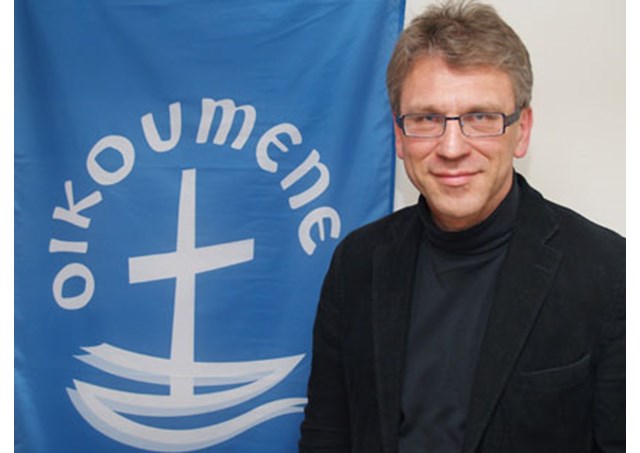
Churches and agencies formulate responses to Ebola outbreak

To respond to the Ebola crisis in West Africa, which has claimed more than 3,000 lives, the World Council of Churches (WCC) has brought to a round table representatives of Christian aid organizations and United Nations agencies so that they could exchange ideas and propose solutions towards combating the Ebola Virus Disease. This is according to a news release item from the World Council of Churches. The WCC consultation, held 29 September in Geneva, Switzerland, affirmed a greater role for the churches and Faith-Based Organisations (FBOs) in helping to stop the Ebola epidemic.
The Ebola crisis in West Africa is the largest of its kind since the 1976 outbreak. More than 6,200 people have been infected with the virus in severely affected countries of Guinea, Liberia and Sierra Leone. Acccording to World Health Organization (WHO) reports, it is estimated that numbers of infected persons could easily top 1 million by January 2015.
A recent UN meeting in New York strongly urged stepped-up efforts to stop Ebola,
naming it a “public health crisis” and a “threat to peace and security.”
The gathering of churches and agencies in Geneva emphasised the need for all to work
together: Politicians, media, communities and faith organizations.
It was acknowledged that faith organisations in Africa have a huge role to play if Ebola is to be stopped. Participants stressed that churches and other religious communities have a greater reach to their grassroots populations and thus could influence them positively by offering practical advice about hygiene and safe funeral practices. Faith organisations and agencies were also urged to find innovative ways of addressing deeper cultural and religious roots of widespread stigma and discrimination that have accompanied the Ebola epidemic.
Dr Gisela Schneider from the German Institute for Medical Mission, who was in Liberia recently, shared observations from her visit. “Christian hospitals are highly vulnerable,” she said. “This is why ‘keep safe, keep working’ is an important slogan for the health workers serving Christian hospitals in Weswt Africa. She said that “people working on the ground needed a great amount of encouragement, training, mentorship and support.” Dr. Schneider added that while it was important to increase health facilities that reach the household level, it was equally “crucial to empower local communities to take care of themselves.”
Dr David Nabarro, the UN Secretary General’s Special Envoy for Ebola, joined the consultation via Skype from New York City. He shared details of the UN strategy and actions in addressing the Ebola crisis in collaboration with local governments and international bodies. Dr. Nabarro also mentioned an increase in efforts from the Security Council and engagement from the African Union in dealing with the impact of Ebola.
WCC general secretary Rev. Dr Olav Fykse Tveit in his remarks said that the WCC would facilitate its member-churches and Faith Based Organisations in communicating vital information and “life-affirming messages” while being sensitive to the local culture and traditions. “Churches and faith communities have a vibrant role to play in addressing stigma issues, promoting preventative messages and compassionate alternative burial ceremonies and rituals.” He said
The WCC consultation brought together participants from a number of organisations,
including WHO, UNICEF, UNAIDS, the ACT Alliance, the Lutheran World Federation, Caritas
Internationalis, Global Fund, International Organization for Migration, the World
Student Christian Federation, the World YWCA and the International Labour Organization.
| All the contents on this site are copyrighted ©. |


